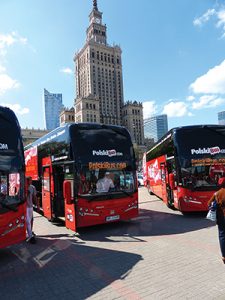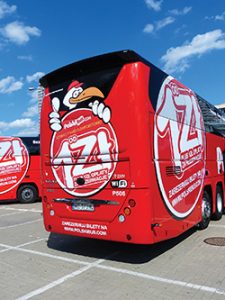
Over the years, I have reported on Stagecoach, Europe’s most successful land passenger transport company, which Sir Brian Souter and his sister, Ann Gloag, co-founded in 1980. When Sir Brian stepped up as chairman, he handed control to Martin Griffiths as chief executive.


A few years ago, Sir Brian established Souter Investments as his family investment office in Edinburgh, Scotland. His investments across a broad range of asset classes, both inside and outside the transport industry, include a major shareholding in Alexander Dennis, a substantial shareholding in Stagecoach and two intercity coach operators based on the megabus.com model.
Separate from the Stagecoach Group is PolskiBus.com, based in Warsaw, Poland; and his more recent investment, Onnibus.com, a network of services mainly in southern Finland.
I recently traveled to Warsaw for the launch of a further expansion of the PolskiBus.com network involving 20 additional high-capacity coaches.


Sir Brian initially developed the megabus.com concept with Stagecoach in the United Kingdom, and further realized its potential in the Polish market with his establishment of PolskiBus.com in 2011 at its first hub in Warsaw. With Sir Brian as president, the company expanded rapidly with a second hub 250 miles to the west in the city of Wroclaw. Cross-border services soon opened to Berlin, Prague, Bratislava and Vienna. Today PolskiBus runs 130 coaches and employs 700 people.



Until recently, the fleet consisted entirely of high-capacity Van Hool models, mainly the Altano, which has a driving compartment and a couple of seats below a full length main deck. There are also some Astromega double-decker coaches. PolskiBus does not achieve high capacity by cramming seats closely together, but by specifying the longest models available. The third axle is steerable on all for excellent maneuverability.
The 20 new vehicles launched in August are 75-seat over-deck bodies with an overall length of 49 feet, 3 inches built on the Volvo tri-axle chassis by the Plaxton factory of Alexander Dennis.
The front entrance is double-door width, and there is a second staircase from the upper deck just ahead of the rear axles. Between the first and second axles there is ample space to store luggage.
The tastefully trimmed red leather seats feature three-point safety belts, charging points for laptops and mobile phones, as well as free Wi-Fi.
Souter says one of the reasons to purchase the Volvo Plaxton coaches had to do with their fuel burn per seat being better than any other vehicles in operation — an important factor where fuel in Poland accounts for 35 percent of costs.
In its short history PolskiBus.com has already carried more than 8 million passengers and has become a remarkably well established brand. Much of this is down to clever marketing, with the company logo prominently displayed on each vehicle, celebrating the fact that Poland has the world’s largest population of white storks.
Chief Executive Barry Pybis, a resident of Poland, says attractive ticket prices start from one Polish zloty plus one zloty booking fee for people who could plan their journeys ahead (one zloty equals $.30 US). He announced new routes, starting in September and October, including a cross-border service to Vilnius, the capital of Poland’s northern neighbor, Lithuania. Frequencies will increase on other routes, including 33 journeys a day between the southern cities of Wroclaw and Krakow.
Managing Director Piotr Bezulski notes that research has shown that 23 percent of passengers have given up using their own cars to travel with PolskiBus.com.
Sir Brian praises the team in Poland, saying their expertise is beneficial in rolling out the PolskiBus.com model in other countries.
“Planning a strategy is the easier part,” he says. “The real skill is getting the coaches out on time every day and delivering a top class service. Our team in Poland is superb at achieving that.”
Asked if PolskiBus fears competition from the Polish railways, which are modernizing and introducing faster services, Sir Brian says certainly not.
“In the UK, Stagecoach runs trains between London and Manchester and also frequent express coaches,” he says. “They are two different markets. We have grown our business with both modes and have taken people out of their cars. They can work or relax on our trains and coaches.”

Asked if PolskiBus will introduce sleeper coaches between Warsaw and Berlin, Sir Brian says the German authorities will not allow coaches with flat beds. He says that this seems strange, particularly as Germany, at long last, is opening up coach services to deregulation and the market is growing quite quickly.
Asked if the coaches were over specified and too luxurious, Sir Brian says once a person has eaten fillet steak, he doesn’t like going back to sausage, making the serious point about establishing high customer standards.
I met with the managing director of Onnibus.com in Finland. He and his partner started the company three years ago and the concept took off rapidly. The company is based in Tampere, while Helsinki is the main hub.
When Onnibus.com needed more capital to expand, the partners approached Souter Investments. Sir Brian visited them, looked at their business model and recognized it was based on megabus.com. He suggested a number of improvements, took a majority shareholding and is in the course of adding 21 Van Hool Astromega double-decker coaches to the fleet.
These coaches come with additional features to cope with freezing Finnish winters, and include extra heating and the facility for the interiors to be brought up to a comfortable temperature before leaving the depot.
The investment will enable Onnibus to develop a new national network of express coach services and to invest in its operations, internet and customer service infrastructure. Following the Polish example, it will also strengthen brand recognition.
